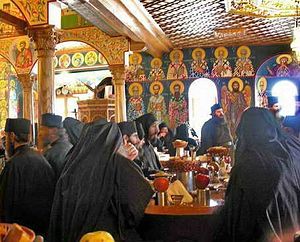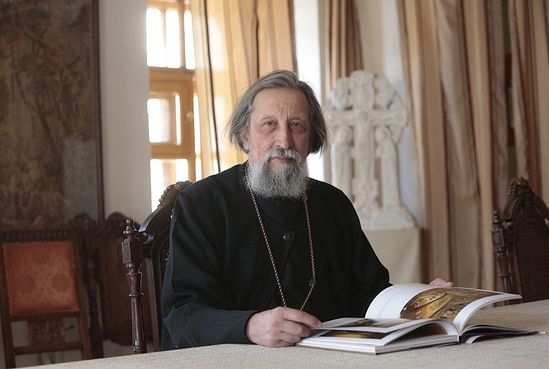SOURCE: On Behalf of All
The spiritual discipline of fasting is something that has been part of the religious life of man since the very beginning. In the Paradise of Eden, the Lord commanded Adam: “From every tree that is in the paradise you may eat for food, but from the tree for knowing good and evil, you will not eat from it. And on whichever day you eat from it, you will surely die” (Gen. 2:16-17, LXX).
When Adam broke the fast — eating of the tree before he was mature enough to handle it — the consequence was corruption unto death. Through one man’s sin, death entered the world (cf. Rom. 5:12). While some fathers have speculated as to whether or not man was always intended to eventually partake of the tree, and die unto resurrection, what we know for sure is this: Adam was meant to abstain; he was meant to fast. He was meant to say “no” to his own desires, so the he could say “yes” to God. We don’t fast in order to “merit” anything from the Lord, but rather to become like God, imitating Christ in his 40-day struggle in the wilderness. And when Christ was tempted by Satan (as all those who are engaged in Christian fasting will experience), his reliance upon both prayer and the promises of God were enough to sustain him.
Of this subject of fasting, the Lord himself taught his disciples:
Moreover when ye fast, be not, as the
hypocrites, of a sad countenance: for they disfigure their
faces, that they may appear unto men to fast. Verily I say
unto you, They have their reward. But thou, when thou
fastest, anoint thine head, and wash thy face; That thou
appear not unto men to fast, but unto thy Father which is
in secret: and thy Father, which seeth in secret, shall
reward thee openly.
St Matthew 6:16-18, KJV

Along with the fasting from food, however, one must also fast from every other passion or sin. Otherwise, our fasting is truly in vain. As Orthodox Christians, we hymn, ”Let us abstain from passions as we abstain from food“ on the eve of Great Lent, and Saint John Chrysostom likewise warns, ”What good is it if we abstain from eating birds and fish, but bite and devour our brothers?” When the apostle Paul tells the Roman church, “put ye on the Lord Jesus Christ, and make not provision for the flesh, to fulfil the lusts thereof” (Rom. 13:14, KJV), the emphasis is not the rules and regulations of fasting, but rather on the transformation of one’s soul and body; one’s transformation into a true and complete image of God, after the likeness of Christ.
When the apostle tells the Galatians, “Walk in the Spirit, and ye shall not fulfill the lust of the flesh. For the flesh lusteth against the Spirit, and the Spirit against the flesh: and these are contrary the one to the other: so that ye cannot do the things that ye would” (Gal. 5:16-17, KJV), he shows us yet again that we are “at war” with our own flesh or desires; the “lust of the flesh.” In order to be spiritually renewed as a Christian (and into a true human being, as Christ), one must strive to place the importance of that which is eternal over the temporal desires and passions that tempt us (and which Satan and his minions use to tempt us).
The purpose of fasting is not dieting or carnal in nature, but rather gets to the heart of what it means to be truly human. Our relationship with the Father was distorted in the Garden, and only through true spiritual renewal — such as can be experienced through the ascetic discipline of fasting, coupled with both prayer and almsgiving – can one “grow” to become greater than one’s flesh.
This is one of the major reasons that fasting is an integral part of the Christian life, and it is certainly a discipline both taught and encouraged by the Lord himself. However, one must always do so with the right heart, in the right manner, and for the right reasons.







